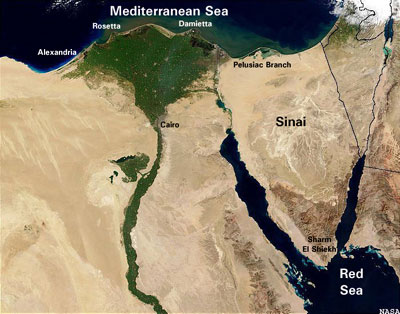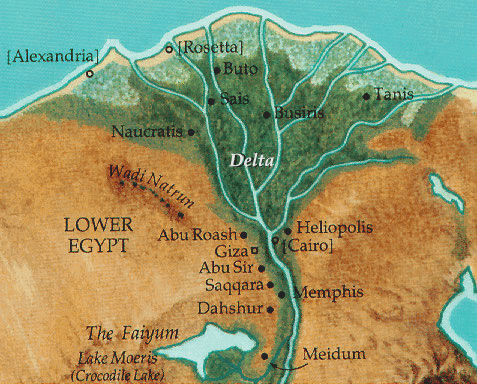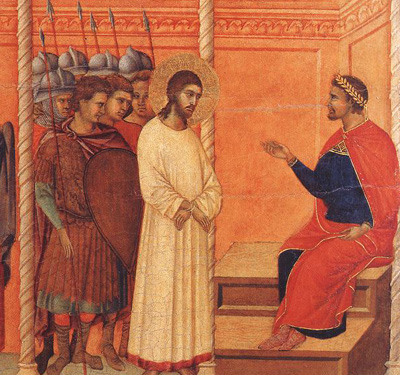© 1998-2014
Fellowship at Cross Creek
Gen. 47:1-12; 27-31
Shepherding in Goshen, while still Holding out Hope in God’s Promises…
6.1.14
(Source: Wikipedia) Lights at night reveal civilization along the Nile River and its Delta. Israel is revealed by the lights to the right and east of the delta.
Intro… One question: why, despite having been reunited with his long, lost son, despite having his family not wiped out by the severest of famines, despite being given the best lands of Egypt to graze his sheep and despite blessing the greatest leader in the world at the time, the Pharaoh of Egypt, does Israel, shortly before he dies, make his son Joseph radically swear to NOT bury him within Egypt, but rather to bury his bones with his fathers within Israel’s promised inheritance?
Is it because, despite having been granted the best lands in Egypt, Egypt is NOT home for Israel? That Israel’s Promise Lands, though not ready for them, are home to Israel—the home that God, out of his gracious goodness to Israel, has promised to Israel?
Which leads to this perhaps thoughtful, perhaps abstract question: is a part of our struggle…man’s struggle…God’s children’s struggle…my struggle… with Terra Firma…or Earth…despite all of its incredible grandeur and mystery…that we were NOT made for Earth, but we were made for heaven? That we were NOT made for Goshen–it is only our temporary home…and a home that ultimately will decline under a later, harsher master? We were made for our Promised Inheritance?
If true, what does this mean? What might this look like now on earth and then in heaven? And if this is our temporary home and shepherding sheep is our profession, how do we best cope with and live in our temporary home?
Egypt pictured with her fertile Nile Delta and where Goshen was located
Summary of Recent Explorations…
The Creation: The Creator Creates His Creation and its Caretakers (Adam and Eve). Gen. 1-2.
• The Fall: But a Crafty Adversary Emerges, Infecting the Creator’s Caretakers with a Virulent Strain of Deceptive Evil (non-beneficial actions). Gen. 3-4.
• The Flood: The story of the righteous Servant and a devastating Flood. In order to Save his Creation from a self-destructive and merciless evil, the Creator Must radically purge or cleanse his Creation Gen. 5-7.
• Creation’s New Beginning…Gen. 8-11.
• Creation’s New Caretaker: The Creator Raises up, Chooses and Greatly Blesses a righteous and trusting Caretaker named Abraham. Gen. 12-25.
• The Torch of the Creator’s Trusting Caretaking Now Passes to Succeeding Generations (Isaac, Jacob, Joseph…) Gen. 26ff.
Joseph’s Story…Gen. 37-50.
• Jacob’s older sons grow deeply resentful of their favored youngest brother, Joseph. Gen. 37:1ff.
• Joseph’s jealous older brothers cruelly sell their younger brother Joseph, against his will, into slavery, and then inform their grieving father, Jacob, that Joseph has been killed by wild animals. Gen. 37:12ff.
• Despite being trafficked as a slave and falsely imprisoned, God’s favor mysteriously still accompanies Joseph. Gen. 39:1ff.
• Despite correctly interpreting the baker and cupbearer’s dreams while in prison, Joseph’s good deeds, go momentarily unrewarded. Gen. 40:1ff.
• When Pharaoh’s cupbearer recalls how Joseph correctly interpreted his dream of restoration to Pharaoh’s court while he was imprisoned along side Joseph, he recommends Joseph to Pharaoh to interpret Pharaoh’s dreams. When Joseph is able to interpret Pharaoh’s dream correctly, as seven years of plenty followed by seven years of famine, Joseph is finally delivered from his false imprisonment. Gen. 41:1ff.
• Pharaoh empowers Joseph to guide Egypt through these next fourteen years of plenty and famine. Gen. 41:38ff.
• Due to the famine, Joseph’s brothers, come to Egypt in search of grain. Unknowingly, the Egyptian ruler that they seek to purchase grain from is their younger brother Joseph. Sensing a divine plan, Joseph accuses his brothers of spying and forces them to leave their brother Simeon behind as surety that they will return with their youngest brother Benjamin. Gen. 42:1ff.
• When Jacob’s sons tell him of the bargain that they were forced to accept for their grain, Jacob initially refuses to risk losing a third son. Gen. 42:19ff.
• Finally, with grain supplies running low, Joseph’s brothers are able to persuade their father to allow them to return to Egypt, accompanied by their youngest brother, Benjamin, to purchase more grain. Their return to Egypt with Benjamin is rewarded with a great banquet held in their honor in the presence of the Egyptian ruler whom had originally sold them the grain. Gen. 43:1ff.
• Once again, the brothers have their departure from Egypt momentarily aborted under the false pretenses that one of them has stolen a silver cup. When the missing cup is found in Benjamin’s sack, his older brother Judah now offers himself to serve in Benjamin’s place in order that Benjamin might return home safely to their father. Gen. 44:1ff.
• When he can no longer contain his pent-up emotions, Joseph finally reveals himself to his brothers, warning them of the famine’s severity and their need to return here with their father to live in the shadow of Egypt’s great providence. Gen. 45:1ff.
• Pharaoh offers the children of Israel the best that Egypt has to offer. Gen. 45:16ff.
Pray; read three times (perhaps just twice) and ask questions…
47:1 Then Joseph went in and told Pharaoh, and said, “My father and my brothers and their flocks and their herds and all that they have, have come out of the land of Canaan; and behold, they are in the land of Goshen.”
2 He took five men from among his brothers and presented them to Pharaoh.
3 Then Pharaoh said to his brothers, “What is your occupation?” So they said to Pharaoh, “Your servants are shepherds, both we and our fathers.”
So why does Pharaoh ask this? To see where Joseph’s family might fit in?
4 They said to Pharaoh, “We have come to sojourn in the land, for there is no pasture for your servants’ flocks, for the famine is severe in the land of Canaan. Now, therefore, please let your servants live in the land of Goshen.”
5 Then Pharaoh said to Joseph, “Your father and your brothers have come to you.
6 The land of Egypt is at your disposal; settle your father and your brothers in the best of the land, let them live in the land of Goshen; and if you know any capable men among them, then put them in charge of my livestock.”
Though his brothers didn’t deserve this honor because of their connection with Joseph and God’s providential plan, Joseph’s brothers are not only being allowed to pasture their flocks in the land of Goshen, but Pharaoh is offering them a job—to care for the Pharaoh’s flocks.
7 Then Joseph brought his father Jacob and presented him to Pharaoh; and Jacob blessed Pharaoh.
8 Pharaoh said to Jacob, “How many years have you lived?”
9 So Jacob said to Pharaoh, “The years of my sojourning are one hundred and thirty; few and unpleasant have been the years of my life, nor have they attained the years that my fathers lived during the days of their sojourning.”
In essence, Jacob is complaining here when he says both few and unpleasant have the years of my life? They don’t seem few. 130 seems like a lot, but in comparison to his forefathers, I suppose they are. The age of the Israel’s patriarchs is coming to a close. The times, they are a changing…
10 And Jacob blessed Pharaoh, and went out from his presence.
Why Jacob blesses the mighty Pharaoh, a seemingly great honor, and the Pharaoh allows it. Israel has come far since Abraham was called by God to father a nation and move to the Promised Land.
11 So Joseph settled his father and his brothers and gave them a possession in the land of Egypt, in the best of the land, in the land of Rameses, as Pharaoh had ordered.
Note: the current Pharaoh need not be Rameses. This could be Moses’ editorial note added four centuries after these events to allow his current readers to know the specific place where this land is located, or there may indeed been an earlier Pharaoh named Rameses that history has of yet not discovered.
(On an interesting side note, many scholars date Ramses I to the 1290s BC, which is about a century and half later than the Bible’s conservative dating of the Children of Israel’s Exodus out of Egypt. In addition, it was only about a decade ago that what many believe to be a royal Egyptian mummy was returned to Egypt after spending almost a century and a half in a private Canadian museum. And whose mummy was it? Many now believe it to be the lost mummy from Rameses I’s empty sarcophagus which was discovered in the Valley of the Kings at Luxor. So in essence, the great Rameses I’s mummified body spent almost a century and a half in North America as a cheap tourist attraction! [See http://news.nationalgeographic.com/news/2003/04/0430_030430_royalmummy_2.html]
Though he be a king, he is still just a man…
Let the name of God be blessed forever and ever for wisdom and power belong to Him. It is He who changes the times and the epochs;
He removes kings and establishes kings. Dan. 2:20-21.
James 4:13 Come now, you who say, “Today or tomorrow we will go to such and such a city, and spend a year there and engage in business and make a profit.” 14 Yet you do not know what your life will be like tomorrow. You are just a vapor that appears for a little while and then vanishes away. 15 Instead, you ought to say, “If the Lord wills, we will live and also do this or that.”)
12 Joseph provided his father and his brothers and all his father’s household with food, according to their little ones.
Interesting modifier according to their little ones.
27 Now Israel lived in the land of Egypt, in Goshen, and they acquired property in it and were fruitful and became very numerous.
Property they owned? It doesn’t surprise me. Everywhere Israel has gone it ends up thriving…
28 Jacob lived in the land of Egypt seventeen years; so the length of Jacob’s life was one hundred and forty-seven years.
29 When the time for Israel to die drew near, he called his son Joseph and said to him, “Please, if I have found favor in your sight, place now your hand under my thigh and deal with me in kindness and faithfulness. Please do not bury me in Egypt,
Kindness and faithfulness…checed and ‘emeth…loyal love and reliability?
30 but when I lie down with my fathers, you shall carry me out of Egypt and bury me in their burial place.”
And he said, “I will do as you have said.”
31 He said, “Swear to me.”
Apparently, this was very important to Israel and he did not want Joseph placating him with false words, as if Joseph would ever do this?
So he swore to him.
Then Israel bowed in worship at the head of the bed.
While the Hebrew allows for in worship to be added to bowed, one wonders if here bow simply means to bow one’s head back down as if one is weak to begin with and has now received resolution concerning their most and final concern. Now they can rest and thus bows their head?
Who?
Where?
When?
What?
• First, Joseph informs Pharaoh that Joseph’s family has arrived and are staying in the land of Goshen.
• He then introduces his brothers to Pharaoh who asks their occupation?
• The brothers reply as Joseph had earlier instructed them—they are shepherds that desire to graze their flocks in Goshen.
• Pharaoh not only graciously grants their request, but offers them the job of keeping his flocks as well.
• Then Joseph introduces his father Israel to Pharaoh. Israel blesses Pharaoh.
• Israel lives in the land of Egypt for another seventeen years. His family flourishes and grows rapidly.
• As the time approaches that Israel is about to die he calls Joseph in and makes him swear that Joseph will bury Israel back in their Promised Land.
• Joseph swears and Israel bows his head.
Summary: That while Israel even blesses Pharaoh for granting Israel and his sons’ request to settle down and graze their flocks in the rich lands of Goshen, Israel, close to his death, still makes his son Joseph promise him that he will not bury his body here in Egypt, but with his fathers back in Israel’s Promised Lands.
Why did God include this event in his record or what would we not know–about God, life, myself, others, etc.–if this story were not in the Bible?
• That while Israel accepts the deal to accept his son Joseph’s deliverance to move to Egypt’s best grazing lands in order to survive the severe famine, near his death, Israel makes Joseph swear to him that he will return his body back to his father’s burial ground in order to be buried. He will not be buried in Egypt. Israel is the Promised Land, not Egypt, not Goshen and certainly not forever. God’s promise to bless Israel and his fathers with a special land, great people and great blessing, still holds true. Residing in Egypt, while being God’s obvious providential protection, is only a temporary solution. Israel exists in his promise lands, not Egypt, which all makes for a great comparison or foreshadow of God’s children existence on Terra Firma or earth now, until heaven. Earth is incredible, as Goshen was. Earth allows mankind to grow up and develop, but earth is NOT our final promised destination. Heaven is. Heaven and life in the presence of God is and always will be the prize…our prize. We accept Goshen. We get it. But our bodies will be buried back in our inheritance. Despite Egypt’s greatness and sheltering shade, we will dwell within God’s promise.
So What?
Thanks… 1) A lot of difficult, good, challenging pastoral counseling these days. Almost nothing mild. Lots of sin or imperfection, but God seems to grace me with some very special, specific insight, either within the session or even before. I mean clear as day. And even when I think it won’t happen, it happens, almost exactly as I saw it would go.
2) God is graciously using Shelly to hold me accountable to publish.
3) Teaching went well again. Had an outline and was able to stick with it. No Keynote again.
Revisited John 10. I think they got it.
Not only has the Good Shepherd come to save his flock from destruction, giving each sheep a second chance or eternal life with God through the sacrificial giving of his own life, but through the giving of his Spirit and the Spirit’s truth and power, to give his flock super-abundant life in the here and now.
And how does he do this or what does this super-abundant life look like now? 1) Being able to Spiritually hear and respond to the Good Shepherd’s voice as opposed to many who do not hear and therefore do not respond to the Good Shepherd’s voice and call; 2) forgiveness or the joy that is rooted in the divine, heavenly and Spiritual release from all my wrongs, sin and shame. I am forgiven and NO ONE can take that away from me; 3) the gift of God’s Spirit, who through his Word and truths encourages, changes and strengthens me for the difficult journey ahead. Such truths and Scriptures include: a) Converting unmet rights and expectations into privileges (Eph. 4:26-27); b) Learning to ride God’s Spiritual Bike by exchanging my flawed, bankrupted truth for God’s perfect timeless truth (Eph. 4:17ff; Rom. 12:1ff; Col. 3:1ff; 1 Peter 1:1ff), including c) that my most fundamental emotional, Spiritual and cognitive needs have been fully satisfied in Christ—through his redemption (Mark 10:35ff), I am eternally safe and significant. I have value and I have value forever through his atonement and Spirit; d) Be quick to listen; slow to answer and slow to answer and slow to become angry…Feedback…James 1:19-20; e) I can suffer, deflecting the enemies’ many blows or insults because I have been especially equipped with Christ’s Spiritual Kevlar…EGEGE (1 Peter 2:18ff)…and many many more tools, truths, skills, thoughts and Scriptures. I am comforted…4) the ability to communicate with God….prayer; 5) answered prayer; 6) miracles; 7) real authentic, difficult change…8) Spiritual endurance 9) musical intimate worship with and praise of God and 10) the body of Christ…I do this NOT alone. Truly, even in the now, not only do we have the promise of eternal life with God forever through the Shepherd’s atonement, we have abundant life in the here and now through his Spirit. Praise be to God. John 10:10.
Truth(s)… That while Goshen or Earth can be and is mysteriously wonderful, Goshen or Earth is temporary. The promise…or heaven, our promised inheritance…life wit and in the presence of our Creator and Redeemer, is what lives forever.
Struggle… That even while pastoring my flock and living in wonderfully mysterious Goshen or Earth, I still rebel. I still struggle. I still get tired, am tired, procrastinate, resist, put off, delay, tend to avoid etc.
Application… I would like to say because Goshen is not my home; heaven is, but the reality is, while still incredible at times and in many ways, me and Goshen don’t totally mesh. Me, because of my sinfulness and Goshen, because it is still difficult. Perhaps, if I was not sinful or as sinful? But Goshen would still be difficult. In turn, if Goshen were not so difficult? But if I am still sinful, what would Goshen still look like?
Of course, the reason that Goshen is made that much more difficult is because I and my fellow dwellers are still sinful, rebellious, foolish and lazy to begin with.
Now there will become a day when Goshen, in the shadow of the mighty Egypt, will morph into what amounts a mistreated slave labor colony…a people group whose only purpose then becomes to make its masters’ lives better.
Thus I get the pain, sorrow and difficulty even in a different Goshen, but in my NOW-Goshen, I am NOT as mistreated as the plenty of others living throughout the world who are either living in or on the edge of a later-enslaved Goshen, but NOT here and now for me.
Someday, perhaps, but not now. Where I live…Goshen…is in transition. A mixture of both good and bad…growing less good and more bad with each passing day and year, but not yet enslavement and injustice.
And yet, living in early Goshen is still difficult. Goshen is still challenging. Goshen challenges me. I challenge me. The sheep challenge me. Life, sin and evil challenges me.
But am I really ready for my exodus and a reclaiming or living of my promised inheritance…a land, or time, flowing with milk and honey…with no threat of the robber, thief or wolf…in the absolute presence and peace of God? There seems to be something stirring within me that craves some kind of growth, change or victory over both mine own and the world’s imperfection or sin. Something seems lacking if somehow I get pulled in the middle of the game and I have never figured out how to play the game or to play it better. It’s as if my journey is not complete. Before I receive life or eternal life, I want to more fully grasp, accept, embrace, understand or enjoy the abundant life in the here and now (John 10:10), and NOT so because life was easy on the outside, but because I truly got it on the inside AND was able to pass the how to on to others. I want victory, hope and peace in the midst of the struggle—good Goshen or bad, on the way to the Promise Land or reclaiming it.
Tell me this: was Israel supposed to merely exist within the Promise Land with no struggle…no challenges?
Of course not. Israel’s mission was to reclaim the Promise Land at in fact, a great cost of life, which ultimately Israel failed to do or pay and which would ultimately cost Israel greatly because she ended up mixing and becoming one with the same decadent cultures God was intending to judge in the first place (Gen. 15:12ff). Thus Israel ended up never fully redeeming or reclaiming her Promised Land, with the result that Israel was judged as harshly as the wicked nations she had replaced.
In the end, when only one of original twelve tribes that took possession of the Promise Land in the first place survives God’s devastating judgment, and that, only after a divinely-imposed exile and return to the Land, it is through the tiniest of remnants that God keeps hope alive with the eventual incarnation and birth of a Deliverer—and NOT one who just delivers Israel (or now Judah) from her outward tyrants, but a Deliverer who offers every human being ever born on the planet deliverance from sin’s devastating consequences.
And how is this divine deliverance offered and then received? Death. Death to one’s stubborn will and very flawed understanding of how one’s deliverance is ultimately obtained in the first place.
And how does this Spiritual death occur or transpire?
When an individual gives up his foolish fight to secure his own personal deliverance from all the world’s evils, and in turn, then humbly and Spiritually releases this arduous task, struggle and fight back over to his Creator—a Creator who is not only fully capable of delivering his broken, fallen creature through a broken, fallen world’s many deadly and trying perils, but who, through the incredible gifts of his Son and Spirit to his fallen creature (the Son’s atonement for the creature’s sins, both past and ongoing, and his Spirit’s gradual revealing of truth in a new fight to overcome sin’s devastatingly, enslaving attraction), passionately seeks to save his fallen, struggling and desperate creatures.
In fact, it is a part of the Creator’s divine nature, not only to be just, holy and righteous, and therefore, do as he must, judge and condemn sin and evil, but, through his Son’s sacrifice for sin and thus the Divine’s offer for atonement for the creature’s many sins, to be merciful, compassionate, loving and saving as well. In other words, it is a part of the Divine Creator of the Universe’s nature to save. We were created by a Creator who not only creates, but who saves…who delivers.
In other words, it isn’t Oops! Sin, Satan or evil have outsmarted the Creator, but rather the Creator not only has the ability to create, but to redeem, restore and save as well. Our God saves! And he saves first through his Son, Jesus, whose name means Yah or God Saves! Yeshua.
And what does he save us from? Sin. Our sins (Matt. 1:21).
And secondly, through his Spirit, who not only gives us THE TRUTH, BUT continues to reveal and convict us of the REAL TRUTH, he gives us the power to overcome our propensity towards sin, imperfection and evil. Our God truly saves! And not just outwardly, but where sin begins, in the heart of man…our heart. Amen! It is true!
Thus while Goshen is rich and has its temporary purpose within my life and our lives, Goshen still kicks my tail.
Because both I, as a shepherd, and my sheep, as a flock, are definitely being transformed from our very imperfect, rebellious, naïve, lazy, hard-headed, self-centered, devious, deceptive, foolish, temperamental, distracted and tempted natures, shepherding definitely has its many challenges.
In addition, besides being an imperfect shepherd of an imperfect flock, according to Jesus’ words in John 10, there are also thieves and robbers who seek to sneak into my sheepfold through a back-gate or some hole in the fence in order to exploit the sheep. Like naïve Pinochios, the sheep exist for thieves’ pleasure and exploitation, and yet, the sheep who should be aware of this, still don’t get it…like lambs led to slaughter, they tend to be easily mislead.
Then there is the wolf, who is not only on the prowl, but may even disguise himself in sheep’s clothing in order to get a closer look at the sheep. The wolf, according to the Good Shepherd, comes only to steal, kill and destroy the flock. So the already imperfect shepherd must not only attempt to shepherd rebellious, naïve, stubborn sheep, but he must shepherd the flock in the midst of not only thieves and robbers who will attempt to sneak in and exploit the sheep, but a disguised killer of the sheep…whose sole mission it is to steal, kill or destroy sheep.
And then there are the hirelings, who, on the surface seem to care for the flock, especially when things are good or non-threatening, but when push comes to shove, or the vicious wolf begins to savagely attack the flock, in order to save their own skins, abandon or sue for a quickie divorce from the flock. Were they ever sheep to begin with? I’m not sure. Rather, because of their outward giftedness, they seem to have rushed through being a sheep in order to imitate being a shepherd.
No, it’s not easy being a shepherd…a true shepherd that is.
So do I want, crave, desire my final Sabbath rest in the presence of God’s heavenly court now?
I think I do. I crave ease. Wouldn’t we all?
But at the same time, I also realize that whether I live free in Goshen or as a mistreated slave in Goshen, as many of the early Christians lived, and as some still live today, or whether I am in route to the Promised Land, or attempting to subdue or reclaim it, as the children of Israel were clearly instructed, but failed to do, without the incredible, amazing, gracious gifts of the Christ’s atoning forgiveness and the Spirit’s truth and power—I am nothing and have little hope of ever accomplishing anything.
In the end, I suppose, it simply just does not matter where I am in the Divine’s long chain of redemption. Regardless of my role or the season I perform my role within, my only hope and sure salvation lies only in the Son and Spirit, and for that truth, I am both eternally grateful for and mindful of.
Your application:
Biggest Struggle at the moment:
How does what happen here relate to you?
What about your kids?
Biggest Struggles (Imagine these or several–put yourself in their shoes–walk through a day with them at school, at home. What might they encounter?)
Now how does what happen here possibly relate/ (Remember this is only to give you a feel or an introductory hook or a reinforcing took; in there looking, they may come up with something entirely different.)
Remember to have fun, sense the Spirit’s leading and develop a love for these kids.
As always, thanks!
Joe
Scripture quotations taken from the New American Standard Bible®, Copyright © 1960, 1962, 1963, 1968,1971, 1972, 1973, 1975, 1977, 1995 by The Lockman Foundation Used by permission.” (www.Lockman.org).







